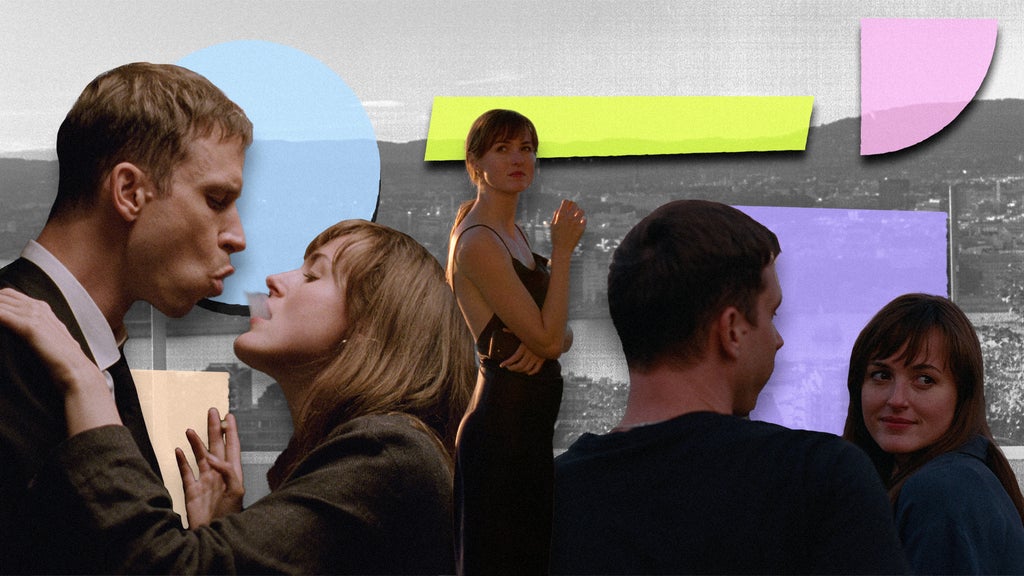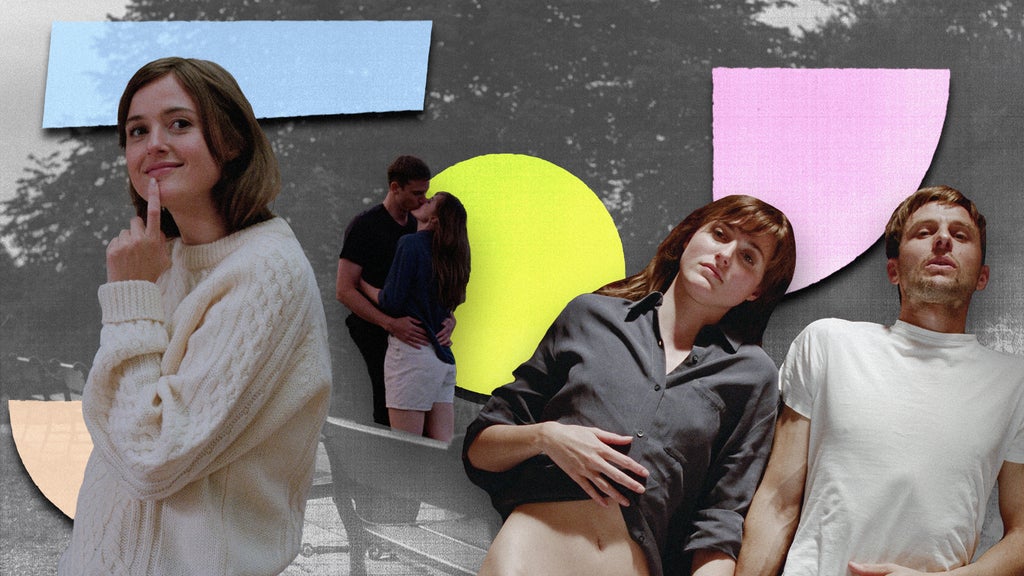There is a moment in The Worst Person In The World where our 29-year-old heroine Julie is walking home when she stops to look out at the beauty and vastness of the city’s skyline, streaked pink with a sunset. Suddenly overcome with emotion, her face crumples. Watching her cry, I felt my own heart tighten in my chest. She doesn’t need to say what she’s thinking because I know it all too well: the uncertainty and feeling overwhelmed by the immense possibilities in a world laid out in front of you. What is my place in all of this? Am I on the right track? In the right relationship, career, city? In MUBI’s Oscar and BAFTA-nominated release from Norwegian director Joachim Trier, never has a film so perfectly encapsulated the experience of teetering on the brink of your thirties, where every decision feels like it will irreversibly make or ruin your life. Turns out it’s a bit of both and that’s OK.
When we first meet Julie (Renate Reinsve), we get the sense she’s going through somewhat of an identity crisis. Call it millennial anxiety or call it turn-of-the-decade panic, she muses dramatically: “I feel like a spectator in my own life.” She doesn’t quite know what she wants, but life waits for no one, so she propels forward haphazardly. She switches courses from medicine to psychology, drops out to take up photography, then works as a bookstore clerk. At the same time, she bounces from lover to lover, letting them fill her up with new ideas, opinions, inspirations and conversation. That is until she falls for successful and established comic book artist Aksel, 15 years her senior, whose friends are already settled down and married with children. He’s an ideal partner, a safe bet even, ready to start a family. But she’s not ready. “I don’t know, I need to do more first,” she tells him.
Most of us will feel that familiar twinge of recognition. After all, who decides when actual adulthood starts? It surely can’t be us. When do we have to stop being selfish and be ready for the next step? There is so much pressure that comes with the societally-imposed milestone of 30 – even more so for women – to achieve, fall in love, be somebody, embark on motherhood, live a full and well-lived life. One montage in the film shows how all the women in Julie’s ancestry – her mother, grandmother, great great grandmother and so on – were already raising two or three children at her age. That gendered pressure is all too familiar; in the media and everywhere else is a constant reminder at how ‘behind’ we are compared to generations before.

In my twenties, I changed my mind every day. I worked in a restaurant, a shisha joint, as a styling assistant – lubing up latex trousers for models to squeeze into. In a law firm. At a newspaper where I saw grown men being screamed at like they were children. Magazines. Fashion. I made a whole new group of friends and left some old ones behind. Regretted how I handled some things – feared I was a terrible person. Some days I was ready to have children and raise a life; other days I couldn’t think of anything worse than the responsibility of never just being ‘one’ again. I too, like Julie, dated everyone. I dated older men – men who made it clear they wanted to have a family, and soon. Panicked, I would leave. I dated younger men – horribly immature, unanchored and hedonistic. Banker bros. Artists. Personal trainers and carpenters. I dated what felt like all the men in London. And they were all wrong.
A turning point for Julie is when she meets handsome Eivind at a party, a fellow millennial and similarly adrift in life. Their instant connection practically incinerates the screen. They smell each other’s armpits, watch each other pee and shotgun cigarettes – time slows down as smoke rings stretch from one mouth to another. It perfectly captures the intoxicating, animalistic way that we fall in love; how we inhale the essence of a person and take something of them as we move forward in life. It mirrored my own experience when I finally fell in love in a big way in my late twenties. After a slew of landmark awful dates, I sat down and wrote a list of all the things I was looking for in a partner – some flexible, some non-negotiable – but with the internal promise that I wouldn’t settle. Every time another bad date would end, I would tweak the list accordingly. That’s how I knew – when I met my current partner – that he was exactly what I was looking for. Like Julie and Eivind’s feral intimacy, in the throes of early romance we would pound our chests at each other like monkeys, play-fight until we were exhausted, steal nicotine from each other in pub gardens and breathe into each others mouths without any agenda other than mingling air. I was suddenly grateful to every bad date and experience that I had gone through prior – how they had all played a part in shaping what I wanted, to lead me to him.

The film purposely chooses not to focus on the major moments in Julie’s life, but instead, hones in on moments that we don’t even realise at the time are significant, shifting the tectonic plates of our existence one way or another, turning us into the person we need to become. An argument here, a comment there, an awkward meeting in a bookstore that can change everything forever. I know I would have forgone a lot of stress in my late twenties if I’d leaned into the unknown and trusted myself a bit more, but honestly, I don’t think I’ll ever master that. Oddly enough, by the time I turned 30, I felt ready and relieved. The number meant nothing to me. Julie’s life changes in a split second and then changes again – her growing a year older has nothing to do with it. It’s all part of her journey.
The Worst Person In The World is a testimony to the fact that no matter how old we get, we will always feel a little scared, uncertain and out of our depth. But there is bravery in starting anew, whether it’s love, work or a lifestyle overhaul. We look out and we think people are happier – that they are ahead and we are behind – but at the end of the day we are on no one’s timeline but our own. If we make mistakes, it is the trial and error that is all part of being human. It certainly doesn’t make us the worst people in the world. So lean into the chaos, revel in your plans falling apart, watch your lover pee, it’s all going to be OK.
The Worst Person In The World is out in UK cinemas on March 25.
Like what you see? How about some more R29 goodness, right here?